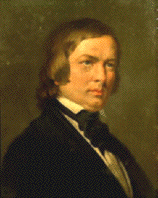June 8: Robert Schumann
Robert Schumann (1810)
It was on this date, June 8, 1810, that German Romantic composer Robert Schumann was born in Zwickau, the son of a bookseller. After his father’s death, his mother encouraged him to go to Leipzig to study law, but he couldn’t focus on it and always was distracted by his love of music and poetry. While still at school in Zwickau, Schumann became engrossed with the works of the German poet-philosophers Friedrich Schiller and Johann Wolfgang von Goethe, as well as Byron and Ancient Greek tragic drama. Deciding at last on music over poetry, and determined to undertake a career as a concert pianist, he lived with and studied under the master, Friedrich Weick.
But Schumann managed to injure his right hand and soon it became impossible to play. Having had the training in all aspects of the musical arts, Schumann fell back onto composition—of both music and music criticism. He edited the musical journal Die Neue Zeitschrift für Musik (1834-1844). Schumann went on to compose, Carneval (1834-1835), Kreisleriana (1838), the opera, Genovena (1847-1850), and a Mass and a Requiem (both 1852), as well as many lieder or songs. His studies had one other benefit: he fell in love with his master’s daughter, Clara Weick, a polished pianist and composer in her own right. But it was five years before they were able to marry (1840), over her father’s strong opposition.
Although religious compositions made up a significant part of Schumann’s works, he was a Pantheist like his countryman, Goethe. As a writer, Schumann was also a reader, and his next-favorite author was the German Romantic novelist and Rationalist, Jean Paul Richter. From 1833, Schumann had suffered from a mental disorder, first manifesting itself as depression, but progressing to a phobia about metals and being poisoned. After a suicide attempt in 1854, for the sake of his wife’s safety, Schumann had himself admitted to a mental asylum in Endenich near Bonn. Schumann died there at age 46 on 29 July 1856, almost certainly from the effects of syphilis (which he may have contracted as early as 1831) and the toxic mercury treatments administered by his doctors. It was Robert Schumann who said, “To send light into the depths of the human heart—this is the artist’s calling!”
Originally published June 2003 by Ronald Bruce Meyer.


